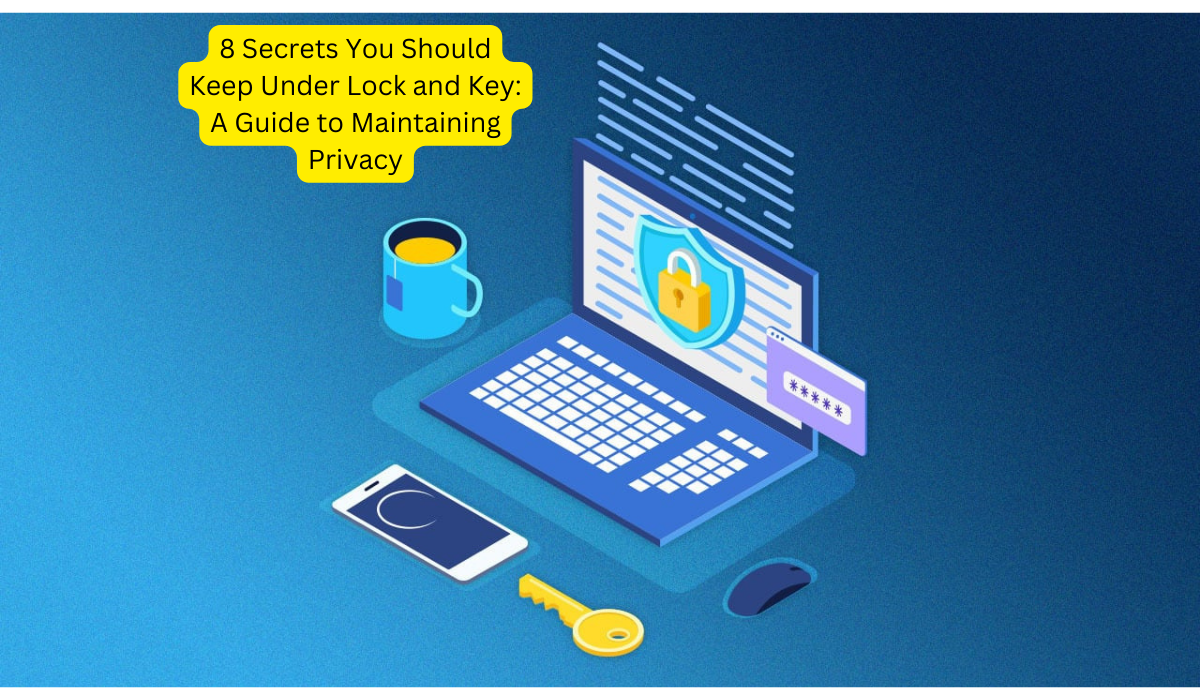Living in a hyper-connected world can feel like there’s nowhere left to hide. Social media thrives on oversharing, and the pressure to constantly “live your best life” online can be overwhelming. But just because everyone seems to be putting it all out there, doesn’t mean you have to follow suit. There are certain aspects of your life that are best kept private, for your own well-being and the sake of your relationships.
This isn’t about building walls and shutting people out. It’s about creating healthy boundaries and protecting your inner sanctum. Here are eight important things you should always keep private:
1. Your Passwords and Financial Information
This one’s a no-brainer. Think of your passwords and financial information as the keys to your digital and financial kingdom. Sharing them is like handing a stranger a spare set. Data breaches and identity theft are real threats, and keeping this information private is the first line of defense.
Imagine someone getting access to your bank account details. Not a pleasant thought, right? So, keep your passwords complex, unique, and never share them with anyone (except maybe a trusted family member managing a joint account, but with clear communication beforehand).
2. Your Relationship Struggles
Social media might paint a picture of perfect relationships, but the reality is, every couple goes through rough patches. Airing your dirty laundry online only serves to dramatize the situation and potentially damage trust with your partner.
Think about it this way: Would you want the whole world privy to your most intimate arguments? Probably not. If you’re facing relationship issues, seek advice from a trusted friend, family member, or therapist. Venting online might feel good in the moment, but it’s rarely a constructive solution.
3. Your Income and Investments
Money can be a sensitive topic, and bragging about your income or investments can alienate friends and family. It can also make you a target for those looking to take advantage of your financial situation.
On the other hand, constantly downplaying your financial success can breed resentment. The key is to be discreet. There’s no need to volunteer your salary at every social gathering, but avoid creating a perception of being either a bragger or a scrooge.
4. Your Dreams and Goals
There’s a certain magic in keeping your dreams close to your heart. Sharing them too early with the wrong people can dampen your enthusiasm, especially if they’re skeptical or negative.
Think of your goals as delicate seedlings. They need a safe, supportive environment to germinate and grow. Once you’ve nurtured them privately and gained some traction, then you can share them with those who will genuinely cheer you on.
5. Your Health Concerns
Sharing your health struggles with loved ones for support is perfectly fine. But broadcasting your every medical issue online can be emotionally draining and attract unwanted attention.
Remember, the internet is a vast space, and you never know who might be lurking. Sharing sensitive medical information could lead to unsolicited advice or even discrimination. Choose who you confide in carefully, and prioritize your own emotional well-being when it comes to managing your health.
6. Your Political and Religious Beliefs
Politics and religion can be passionate topics, and discussing them can quickly turn into heated arguments. While respectful debates are healthy, constantly bringing up these subjects in social circles can alienate those with differing views.
Imagine going to a gathering and everyone suddenly starts debating the merits of their favorite political party. Not exactly a recipe for a relaxing evening, right? Choose your battles wisely, and keep these discussions for appropriate settings.
7. Your Family Drama
Family is everything, but family dynamics can be complex. Sharing private family issues online can not only be hurtful to those involved but also damage your relationship with them.
Imagine your sibling seeing a personal detail about your family drama plastered all over social media. It wouldn’t be a pleasant experience, would it? If you’re facing family challenges, keep the lines of communication open within your family unit. Seek professional help if needed, but keep the details of your personal struggles private.
8. Your Feelings of Insecurity
We all have insecurities, but sharing them online gives others a roadmap to your vulnerabilities. People might exploit your insecurities, or worse, they might not take your concerns seriously.
Imagine revealing a deep-seated fear online, only to be met with ridicule or dismissive comments. Not exactly confidence-boosting, right? Work on addressing your insecurities with the help of a trusted friend, therapist, or self-help resources.
Conclusion: Building a Life with Healthy Boundaries
Privacy isn’t about shutting people out; it’s about creating healthy boundaries. By keeping certain aspects of your life private, you cultivate a sense of security, foster trust within close relationships, and protect yourself from negativity. Remember, a life filled with a healthy dose of privacy is a life filled with freedom and empowerment.
FAQs
1. Isn’t sharing everything online the norm these days?
Social media thrives on sharing, but it’s important to curate what you share. There’s a difference between connecting with friends and family and oversharing personal details.
2. How do I know what to keep private?
Use your gut feeling! If something feels too personal to share, it probably is. A good rule of thumb is to ask yourself if sharing this information would benefit you or someone else.
3. What if I’ve already overshared something online?
Don’t panic! Most platforms allow you to delete old posts. You can also adjust your privacy settings to limit who can see your future posts.
4. Isn’t it good to be open and honest?
Absolutely! But honesty doesn’t mean oversharing. You can be open and honest with close friends and family while maintaining healthy boundaries about what you keep private.

